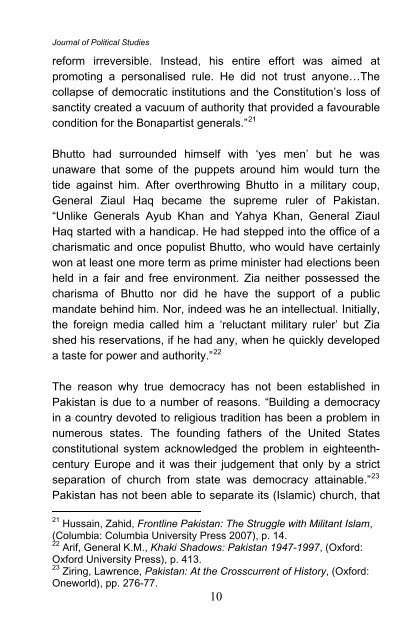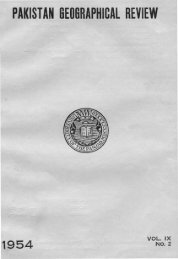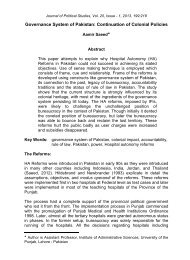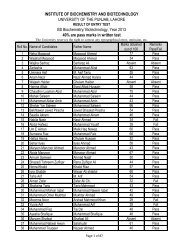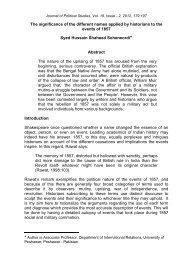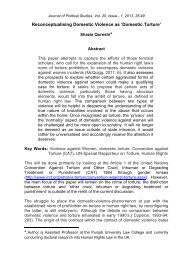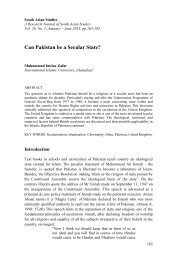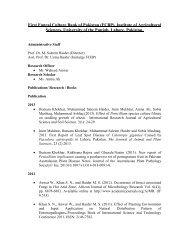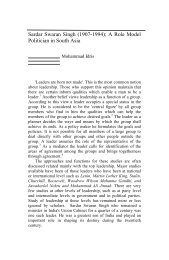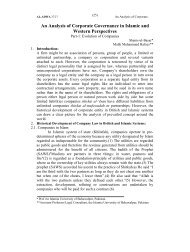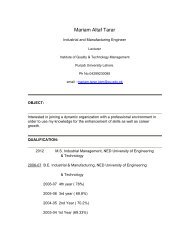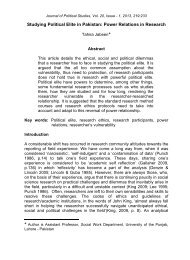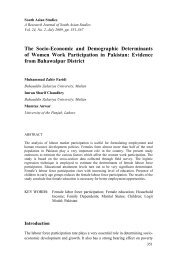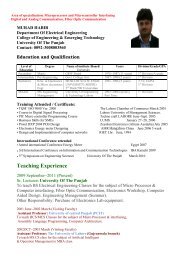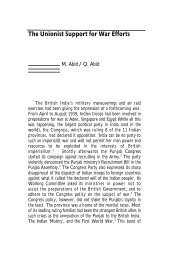Roots of authoritarianism in Pakistan-KU.pdf
Roots of authoritarianism in Pakistan-KU.pdf
Roots of authoritarianism in Pakistan-KU.pdf
Create successful ePaper yourself
Turn your PDF publications into a flip-book with our unique Google optimized e-Paper software.
Journal <strong>of</strong> Political Studies<br />
reform irreversible. Instead, his entire effort was aimed at<br />
promot<strong>in</strong>g a personalised rule. He did not trust anyone…The<br />
collapse <strong>of</strong> democratic <strong>in</strong>stitutions and the Constitution’s loss <strong>of</strong><br />
sanctity created a vacuum <strong>of</strong> authority that provided a favourable<br />
condition for the Bonapartist generals.” 21<br />
Bhutto had surrounded himself with ‘yes men’ but he was<br />
unaware that some <strong>of</strong> the puppets around him would turn the<br />
tide aga<strong>in</strong>st him. After overthrow<strong>in</strong>g Bhutto <strong>in</strong> a military coup,<br />
General Ziaul Haq became the supreme ruler <strong>of</strong> <strong>Pakistan</strong>.<br />
“Unlike Generals Ayub Khan and Yahya Khan, General Ziaul<br />
Haq started with a handicap. He had stepped <strong>in</strong>to the <strong>of</strong>fice <strong>of</strong> a<br />
charismatic and once populist Bhutto, who would have certa<strong>in</strong>ly<br />
won at least one more term as prime m<strong>in</strong>ister had elections been<br />
held <strong>in</strong> a fair and free environment. Zia neither possessed the<br />
charisma <strong>of</strong> Bhutto nor did he have the support <strong>of</strong> a public<br />
mandate beh<strong>in</strong>d him. Nor, <strong>in</strong>deed was he an <strong>in</strong>tellectual. Initially,<br />
the foreign media called him a ‘reluctant military ruler’ but Zia<br />
shed his reservations, if he had any, when he quickly developed<br />
a taste for power and authority.” 22<br />
The reason why true democracy has not been established <strong>in</strong><br />
<strong>Pakistan</strong> is due to a number <strong>of</strong> reasons. “Build<strong>in</strong>g a democracy<br />
<strong>in</strong> a country devoted to religious tradition has been a problem <strong>in</strong><br />
numerous states. The found<strong>in</strong>g fathers <strong>of</strong> the United States<br />
constitutional system acknowledged the problem <strong>in</strong> eighteenthcentury<br />
Europe and it was their judgement that only by a strict<br />
separation <strong>of</strong> church from state was democracy atta<strong>in</strong>able.” 23<br />
<strong>Pakistan</strong> has not been able to separate its (Islamic) church, that<br />
21 Hussa<strong>in</strong>, Zahid, Frontl<strong>in</strong>e <strong>Pakistan</strong>: The Struggle with Militant Islam,<br />
(Columbia: Columbia University Press 2007), p. 14.<br />
22 Arif, General K.M., Khaki Shadows: <strong>Pakistan</strong> 1947-1997, (Oxford:<br />
Oxford University Press), p. 413.<br />
23 Zir<strong>in</strong>g, Lawrence, <strong>Pakistan</strong>: At the Crosscurrent <strong>of</strong> History, (Oxford:<br />
Oneworld), pp. 276-77.<br />
10


